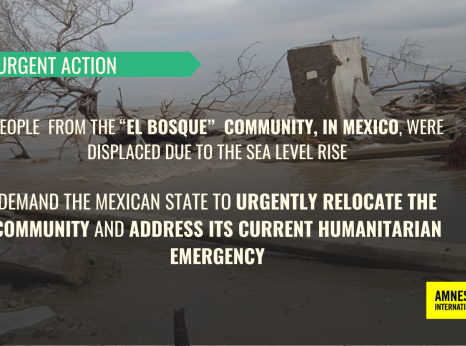Mexico: Climate Displaced People Need A Home Urgently

El Bosque is a fishing community in the state of Tabasco, southern Mexico, affected by rising sea levels and coastal erosion intensified by the climate crisis. Since 2019, due to constant tidal waves and extreme weather events, the coastline of El Bosque has lost 200 meters (about 656.17 ft), resulting in the destruction of homes and community infrastructure. In April 2023, El Bosque community started negotiations with the Ministry of Agrarian, Territorial and Urban Development (Secretaría de Desarrollo Agrario, Territorial y Urbano) of Mexico and the Mexican National Housing Commission (Comisión Nacional de Vivienda en México) to be relocated. However, this process has stalled, leaving the community vulnerable to new extreme weather events, such as the torrential rains of Cold Front 8 on 1 November.
Amnesty International received information about the humanitarian crisis faced by nearly 64 families of El Bosque. Prior to the events of 1 November, the community had already lost more than 50 houses to rising sea levels, forcing people to live in temporary shelters in the community or to be displaced. Also, before 1 November, the community reported that the water wells of El Bosque were already infiltrated by seawater, the healthcare services were neither constant nor adequate; electricity service was intermittent; and due to the destruction of their schools, children were forced to attend classes in an inadequate infrastructure to guarantee their right to education. Following the events of 1 November, the community’s situation has only worsened.
From 1 November, 69 people were in a temporary shelter provided by the Centla’s municipal government in the “Centro Recreativo del Municipio de Centla”. On the night of November 13, members of the community left the shelter, since they reported they were mistreated by the staff, and they did not receive food or water the whole day. Since then, most members of the community have spent their own money to pay a rent or have had to move to relatives’ homes. However, there are people without resources to pay rent, or relatives to stay with, that have been practically left in a situation of homelessness, or have returned to the community despite the risk posed by new cold fronts.
Under international human rights law, the Mexican State must adopt measures to protect, prevent and reduce the risks, losses and damages caused by the foreseeable and unforeseeable consequences of climate change. The development of robust mitigation and adaptation measures could reduce the number of people forced to move due to the consequences of climate change and prevent the aggravation of losses and damages generated by the climate emergency. Unfortunately, the Mexican government has chosen to continue increasing oil production, instead of generating solid commitments for a just energy transition to comply with the commitments made in the Paris Agreement. The situation in El Bosque, and in Acapulco, Guerrero (city that on 25 October suffered the impacts of Hurricane Otis, the strongest storm ever to hit Mexico's Pacific coast), show the failure of the Mexican government to protect the most marginalized groups that bear the brunt of the climate crisis.
The Mexican State also has a duty to ensure that planned permanent relocations are a measure of last resort, and in cases such as El Bosque in Tabasco, where such internal displacement is imminent, it must comply with the framework of international obligations on internal displacement, which establish that a durable solution for displaced persons be achieved. This durable solution must ensure that displaced persons can enjoy, without discrimination, all their human rights, including security; an adequate standard of living, including access to food, water, adequate housing, employment and elementary education; access to work and means of subsistence; and access to effective mechanisms for the restitution of housing, land and property of displaced persons, or to provide them with adequate compensation.